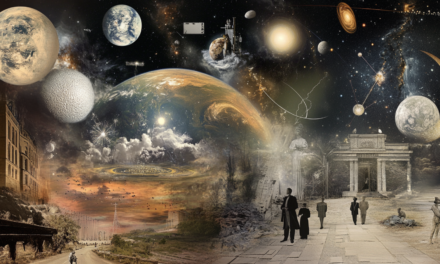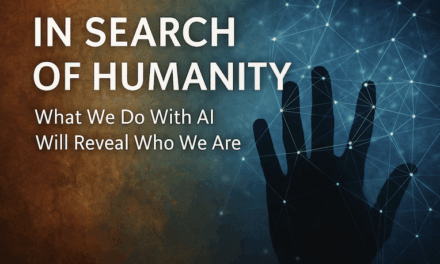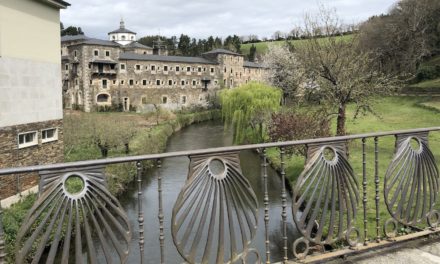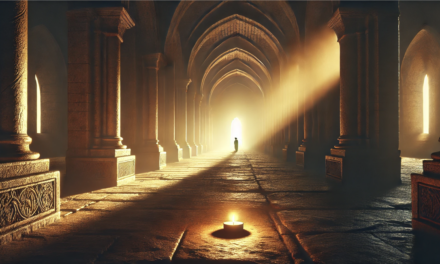An Excellent Question
It’s not often that words fail me. But when my friend Dan asked me this question at lunch the other day, I stuttered and stammered before asking for more time to think about my answer.
It is an excellent question, and as I thought about it further, it dawned on me that answering it would expose a good part of my ‘worldview’.
What is a ‘Worldview’?
A worldview is the grid through which humans perceive reality. For the most part, it isn’t something we are consciously aware of. As Jeremy Lent writes in his book, “The Web of Meaning”, “Like fish that don’t realize they’re swimming in water because it’s all they know, we tend to assume that our worldview simply describes the world the way it is, rather than recognizing it’s a constructed lens that shapes our thoughts and ideas into certain preconditioned patterns.”
In one of the best descriptions of worldviews, the eminent New Testament scholar N. T. Wright says that four questions are implicitly addressed in all worldviews. 1 Who are we? 2. Where are we? 3. What is wrong? And 4. What is the solution?
Dan’s question, as it turns out, is number 3 on the list. And answering it also tends to imply answers to the other three questions.
Problems with Perception
Being unaware of our worldview creates difficulties for us. In terms of our physical senses, such as sight, it is a fact that perception is not identical to reality. For example, in the well-known optical illusion recreated in Picture 1, it is evident that the two squares labelled A and B are different shades of grey. However, copying the same two squares and placing them side by side (as in Picture 2) shows that they are, in fact, the identical shade. Our perception has tricked us.
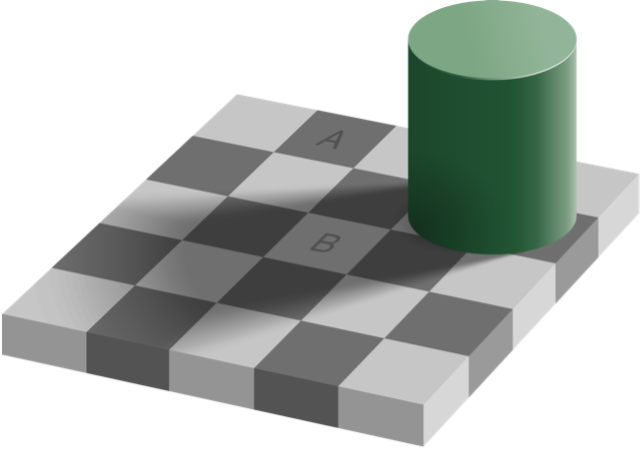
Picture 1: Checkerboard
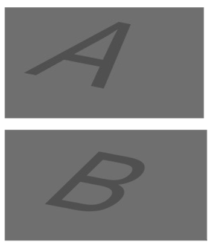
Picture 2: Individual Squares out of context
Perception doesn’t merely record its object like a camera or video recorder. It actively interprets the scene to make sense of it for us.
Perception and Worldview
Earlier in this post, I argued that a worldview is the grid through which humans perceive reality.
When we perceive the world through our worldview, it profoundly influences everything we believe about reality, just as the apparent shadow cast by the green cylinder in Picture 1 influences the appearance of square A relative to square B.
And there’s the rub. Each of us has our worldview – we cannot avoid it. There is no view from nowhere! We are each trapped in our own world, and there is no escaping this truth. Our culture will inevitably shape how we see things for better or worse – without even realizing it has happened! Back to those fish once more.
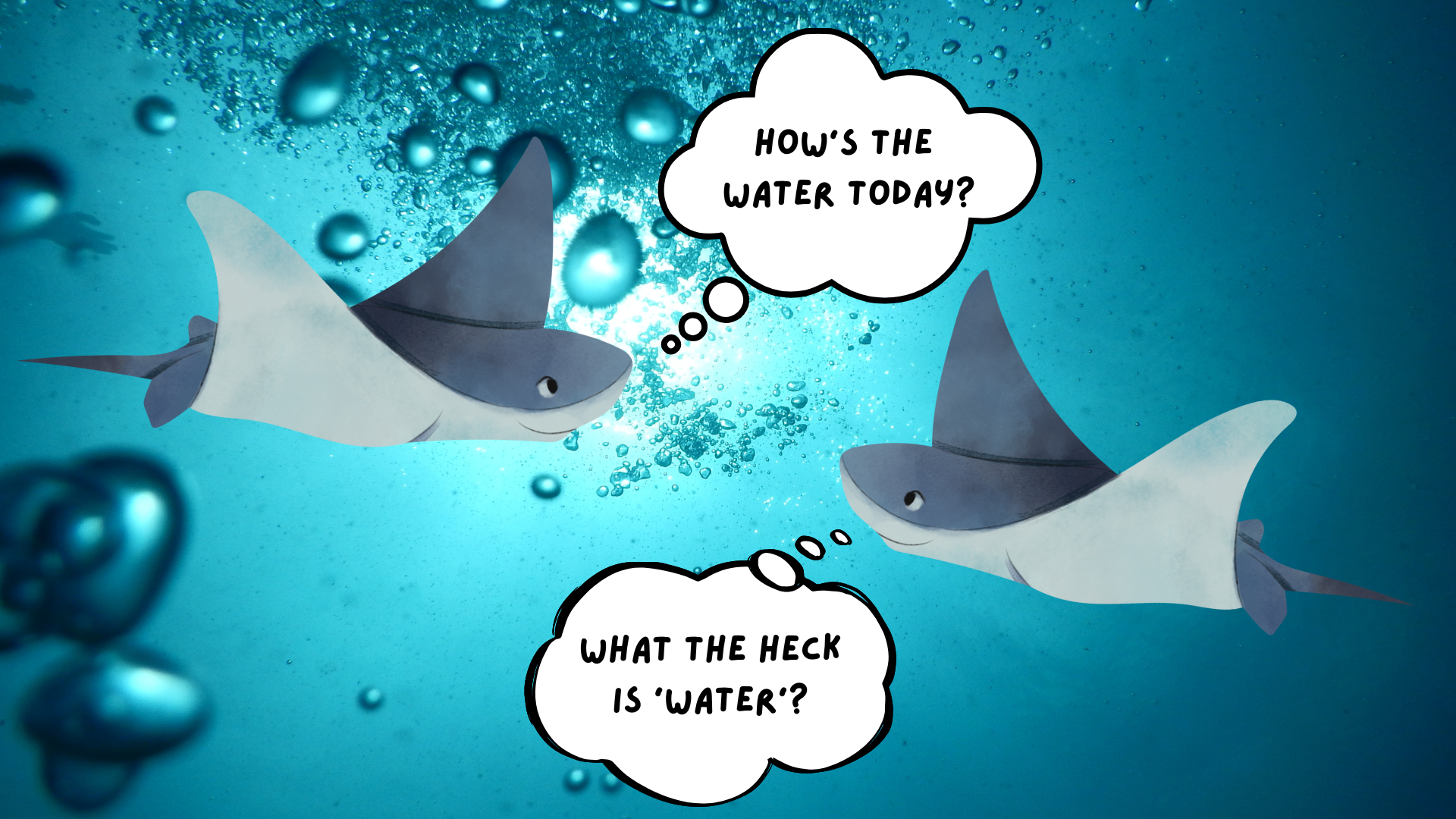
In an earlier blog post, I recognized a widely-held outdated worldview. In fact, since writing that blog post, I have been introduced to the Scientific and Medical Network and its Galileo Commission. Writing on behalf of the latter, Dr Athena D. Potari puts the case more accurately than I did. “Since the 17th century, the ‘grand narrative’ of Western culture has been increasingly dominated by a mechanistic, materialistic and instrumental world view originating in the natural sciences. This has entailed a naturalist ontology based on the primacy of matter and a bottom-up reductionist epistemology whereby the whole is seen as the sum of its parts and the physical universe as a causally closed system.”
One of her conclusions is that “Seeing matter as the ultimate (and only) reality, and human beings as inherently separate has promoted a culture of unhealthy individualism, self-centredness, separatism and extreme consumerism. Modern capitalism and neoliberalism, founded on the prioritization of material wealth and selfinterest, have contributed to increasing social inequalities and a general loss of meaning in younger generations.”[i]
So, What IS wrong with the world?
Each of the following aspects of what is wrong with the world is a facet of our human nature. And it is in the “better angels of our human nature” that we will also find ways of improving the situation. But more of that in a moment.
At present, humanity finds itself in a situation where it faces challenges such as climate change, biodiversity loss, pollution, overuse of the world’s resources, gross inequality, intermittent warfare and terrorism, and mass migration. I believe that several factors contribute to this situation, including most prominently (but not, as the lawyers say, restricted to):
- The dominant worldview is mechanistic and perceives the natural world (and, to an extent, other people) as resources for commercial gain and economic growth.
- Like many other animals, people possess a brain that simultaneously allows us to pay two different kinds of attention to the world. One isolates objects from their context and selects the best immediate survival strategy for the individual. The other perceives the situation in its entirety. We have built a culture and society with an unbalanced dominant worldview that favours the former over the latter. (See “The Matter with Things”)
- Our education system reinforces the mechanistic worldview and fails to teach young people how to think, learn and reason together in diverse groups.
- Tyrannical market forces have replaced despotic Gods to justify and legitimate human domination systems.
- Our culture focuses on human wellbeing at the expense of the earth’s ecosystems and on the individual at the cost of the collective.
- We are a social species but have somehow become stuck in two predominant ways of living: the uncontrolled market-driven capitalism of the so-called ‘free’ world or the centralized power of autocratic states. In both of these cases, we have lost: (1) the freedom to move away or relocate from one’s surroundings; (2) the freedom to ignore or disobey commands issued by others; and (3) the freedom to shape entirely new social realities or shift back and forth between different ones. (See “The Dawn of Everything”)
- Like the sorcerer’s apprentice, science and technology have given us enormous power over the rest of the earth’s ecosystem, but we haven’t yet learnt how to use that power wisely.
And the Solution?
“You can’t solve a problem using the thinking that created it” is a saying widely attributed to Albert Einstein (although I have been unable to track it down so far). However, it seems that the means of improving the current situation lies in our collective ability to learn and think differently. In “Natural Born Learners“, Alex Beard reminds us that “Learning is the soul of our species.” And I can’t help feeling that learning our way out of our dominant worldview by changing how we attend to the world holds the key to lasting and sustainable improvement in the human situation on earth.
I would also like to end this blog post on a more positive note by counterbalancing my list of woes with a corresponding list of the many of life’s blessings for which I am personally grateful. They are purposely general so as not to embarrass my loved ones (although they are probably embarrassed enough by my blogs!).
I am eternally grateful for:
- The gift of life itself
- The opportunity to love and be loved.
- The chance to contribute to creation and evolution.
- The amazing and awe-inspiring cosmos we are born into.
- The joy of learning.
[i] Dr Athena D. Potari (2021) “A Call for a Renaissance of the Spirit in the Humanities”. Paradigm Explorer. 2021/3 www.scientificmedical.net


